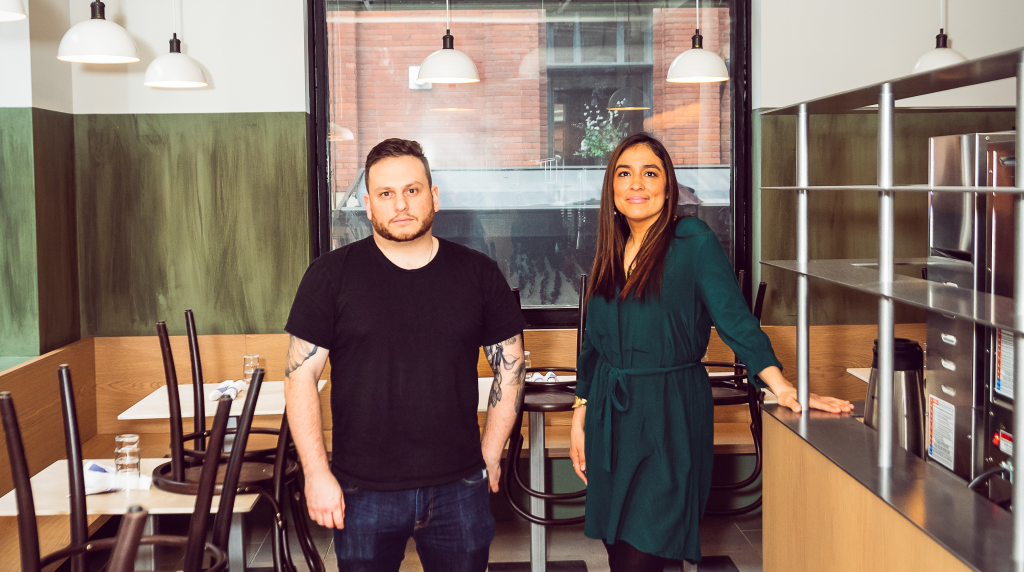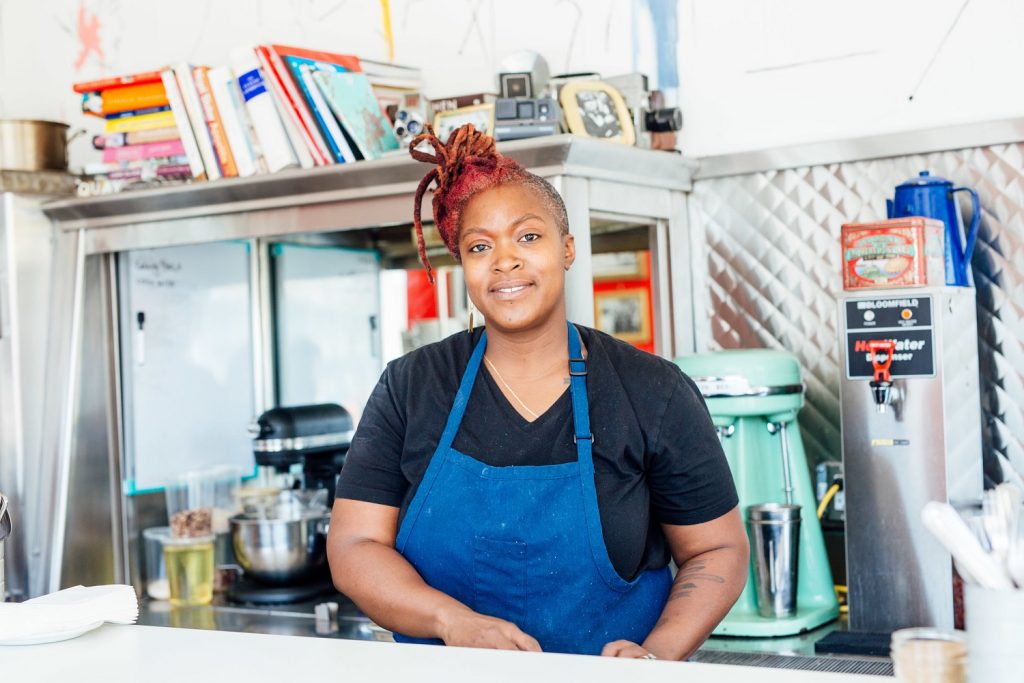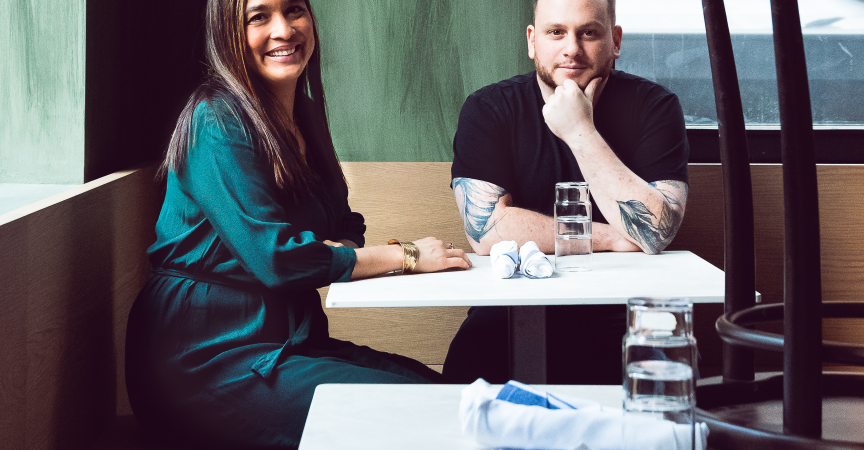A Balanced Kitchen: Mental health in the foodservice industry
This article was originally written in February 2020 to be published in the March/April 2020 issue of MENU Mag. As restaurants reopen and staff comes back to work, rebuilding a team that is not just physically safe and heathly, but mentally as well is essential. While this article was developed pre-COVID, we encourage members of our community to read through the advice and insights to understand how they can implement healthy practices and programs in your operations.
Photos by Stacey Newman & Bettina Bogar
Mental health has been ignored in the hospitality industry for far too long. But a few key players are encouraging important conversations to break stigmas around mental health and encourage safe, positive work environments.
Hassel Aviles was in her twenties when she started working as a server for Jamie Kennedy’s wine bar and his restaurant in the Gardiner Museum. It was the mid-2000s and the work was demanding and fast-paced, but Aviles was excited to be working with high-calibre chefs.
Aviles was skilled at serving her customers with a smile, regardless of whether she had had a rough day or was struggling with her own mental health issues which had worsened in the fast-paced, high-stress atmosphere of restaurant work. “When I entered this industry, it was pretty much around the same time that I started to deal with my own mental illness,” Aviles explains. “For me, it manifests as depression and anxiety.”
Eventually, she sought professional help and was connected to a therapist covered by her provincial health insurance. “The therapy and antidepressants saved my life,” she recalls. “But I didn’t feel comfortable talking about going to therapy.” So, Aviles spent years hiding her mental illness from her boss and coworkers. “I felt too much shame and stigma,” she says. “I also felt that if I told anyone at work that I was living
with depression, I would be fired, easily replaced and probably
never re-hired again in the industry.”
With time, Aviles gained the confidence and awareness to go public with her mental health journey. “I wouldn’t have any embarrassing feelings around telling people I broke my leg, so why would I feel any different if I’m having an anxiety attack or I have a depressive episode?” she says. “There needs to be more conversation around things that come up to do with your mental health, just like people do with their physical health.”
Aviles, who now works as a consultant in the food and the beverage industry is helping to drive that conversation with the work she does with her non-profit organization, Not 9 to 5, which launched in 2017. Alongside co-founder Ariel Coplan, the chef behind Grand Cru Deli and the Green Wood West, Aviles and Coplan host workshops and share resources with the goal of improving mental health awareness and encouraging small shifts in the hospitality industry.
“One of the big things that is unique to this industry is how much certain things are accepted. A lot of the practices are very archaic, like the brigade system,” says Coplan of the military-esque hierarchy that dominates most kitchens. “And addiction is really a common thing within the industry, whether people talk about it or even acknowledge it.”
One way that Coplan and Aviles are working to acknowledge the state of mental health in the hospitality industry is an informal, voluntary survey they conducted through the Not 9 to 5 website from 2019 to 2020. Over 400 people responded—an even split between management, front-of-house
and back-of-house workers.

- 79% of respondents kept their mental health issues to themselves and tried not to let it show
- 65% sought relief by talking to family and friends
- Most worryingly, 56% reported using alcohol to cope.
“The results were eye-opening, but also not surprising, either,” Aviles says. “It was all very validating to what I was hearing and feeling and seeing in my industry for the last two decades.”
While Aviles and Coplan encourage employees to speak up and seek help when they need it, they believe that lasting impacts come from the top down. “Be the change that you want to see,” Coplan says.
He’s manifested that in his own kitchens by not only enforcing breaks among his staff but taking those breaks himself. He makes sure to eat meals in the middle of long shifts. And he lives a balanced lifestyle, trading post-shift drinking sessions with an early start at the gym the next morning. Coplan even arranged for a group discount at GoodLife
Fitness for his staff. It cost him nothing but is a small step to encouraging a healthy routine among staff.
“Anyone in any position of influence or leadership needs to role-model certain behaviour,” reminds Coplan. “You have all these eyes on you, and you have an opportunity to set the standard.”
Changes are slowly happening in the industry. Last year, the Gusto 54 Restaurant Group, which operates six eateries across North America (including the recently opened Gusto 501 on King St E) launched a full health insurance plan for their team members. In Toronto, the costs are covered internally while at Felix, their Los Angeles-based restaurant, a three per cent charge is added to customer bills to cover healthcare benefits.
Toronto’s Mahjong Bar offers staff a $50 wellness stipend per month to spend on whatever they feel is beneficial to their health and wellbeing, whether that’s massages, yoga classes, or therapy. Not 9 to 5 is currently fundraising to help support the development of industry-specific programs, resources, and courses.
Aviles and Coplan are hopeful that these slow, gradual shifts can help to create a better, healthier work environment in the long run. “It’s not just a change in a couple of practices,” Coplan says. “It’s very much a
culture shift to make sure that people are cared for. It’s not going to happen today or tomorrow. But we hope it’s for the next generation of the industry.”
Chef Suzanne Barr on vulnerability in the kitchen
Last September, Chef Suzanne Barr opened her latest restaurant, True True Diner, on Toronto’s King Street East. She shares how honesty and vulnerability helps her lead a happy, healthy kitchen: “This industry is so unforgiving in so many ways. When it’s the slowest of slow, everyone gets a little worried about sales and how we keep the doors open. New businesses hemorrhage at so many levels and you’re trying just to keep afloat sometimes. It’s a lot on you mentally, it’s a lot on you personally, it’s a lot on you in so many areas of your life.”

“I don’t always get it right. I don’t always know where I’m going. I try to be gentle with myself and I’m never afraid to cry too, just to slow down and stop, take a beat and just let release. It’s a real truth that I feel like sometimes we don’t get a chance to talk about because we’ve got to be so solid and firm as restaurant owners. We’ve got to be so together. We’ve got to have the numbers. We’ve got to be able to spit out statistics.”
“We have a few things that we try to stay disciplined with. We’re looking to do something quite different here at True True Diner, whether it’s having motivational words on the wall, whether it’s having a safe box where you can put some of your concerns and issues that you have with management or someone on the team. We aligned ourselves with the Dandelion Initiative to understand how safe spaces are important within the kitchen culture. We’re learning how we can do our part not just as managers, but as a collective team, to make sure that we’re all checking in and we’re all voicing our concerns, and we can feel vulnerable and not be ashamed to ask for help. These are all things that aren’t so typical to find in a kitchen.”
“There’s an importance in being able to be vulnerable and sharing that to your staff. I exercise that — to be able to relate, to show them that you, too, might be going through something. Every day is a new day and I take it bit by bit.”
6 Tips for Improving Workplace Mental Health
Not 9 to 5 offers tips for restaurant staff and management to encourage a positive work environment with mental health in mind.
- Exercise
Sometimes it’s as simple as taking a walk or riding your bike to work. To help encourage your team, reach out to a local gym and request a corporate discount for your staff.
- Take a break
You don’t have to smoke to go outside for fresh air. Getting outside for 10 minutes is enough to hit the reset button. As a manager, hold yourself accountable to the Ministry of Labour laws and ensure that your staff are taking their breaks regularly.
- Nourish your body
We need to place value in making sure that we eat and that the people around us eat as well. We spend our days taking care of guests but we need to take care of our work family first.
- Resources
Active listening is key to a workplace of psychological safety. Managers are never expected to offer treatment but can act as a connector to the appropriate resources. Posting mental health and addiction resources publicly for staff and encouraging a dialogue sets the tone for a
positive work culture.
- Check-in
It’s important for owners and managers to check-in with staff and encourage open dialogue. Whether it’s at line-up or one-on-one conversations, let the team know they work in a place that is open to honest communication, whether things are going well or not.
- Avoid drugs & alcohol at work
It’s not a secret that substance abuse is prevalent in our industry. Management can lead by example and also offer staff alternative rewards besides a post-work drink.
Here are a few mental health organizations that are helping to support hospitality workers across Canada and beyond.
Mind the Bar: Founded by the Vancouver-based restaurant-owner Shoel Davidson, this organization is helping to combat mental health stigmas by sharing stories and resources.
Remise en Place: Headed by the folks behind Montreal’s famed restaurant Joe Beef, Remise en Place is a weekly discussion meeting for industry workers who are or want to get sober. Email jc@joebeef.com for info.
Fair Kitchens: This international restaurant movement offers stories and solutions for tackling mental health in the kitchen. Fair Kitchens has over 200 restaurant supporters across the globe.
In The Weeds: By empowering hospitality workers with info and resources, this community of Edmonton-based hospitality workers is supporting healthy work environments in the city.
Dandylion Initiative: This Toronto-based non-profit conducts training for bars and restaurants to become safer spaces, enabling them to recognize and prevent violence and harmful actions.










1 Comments